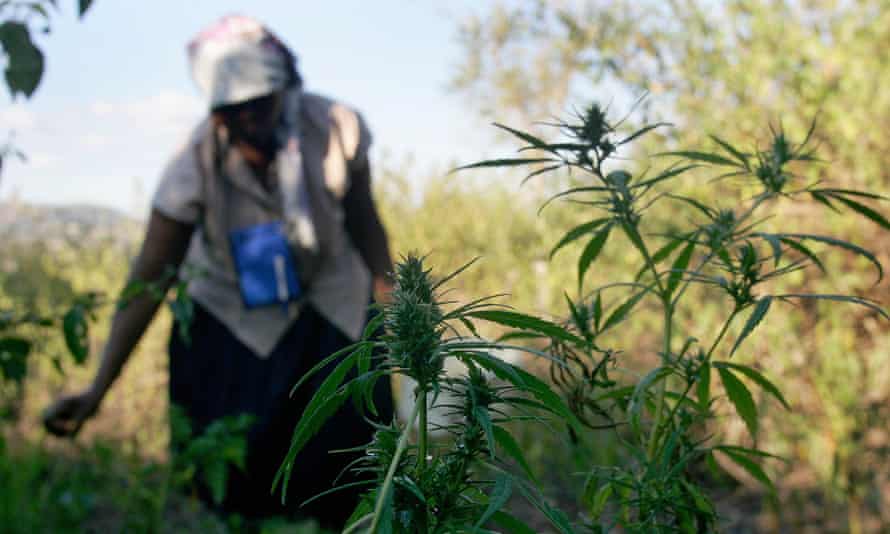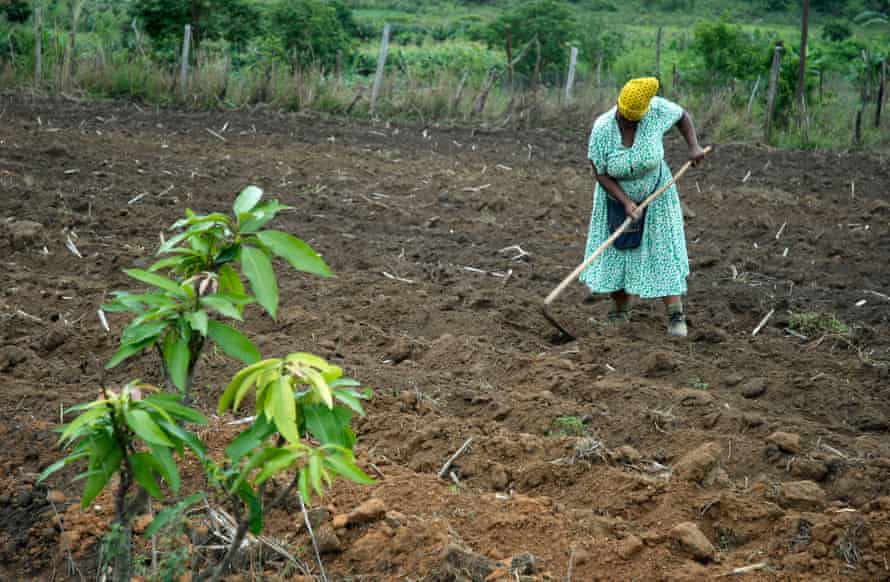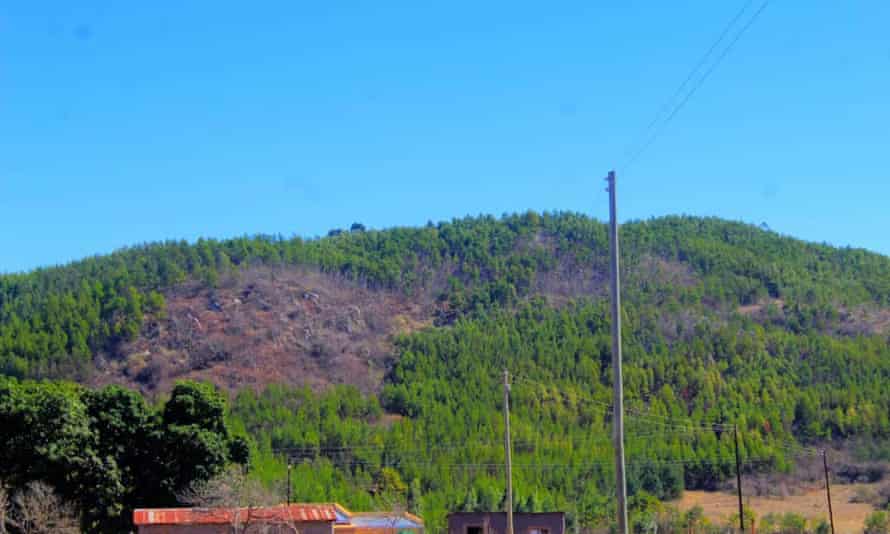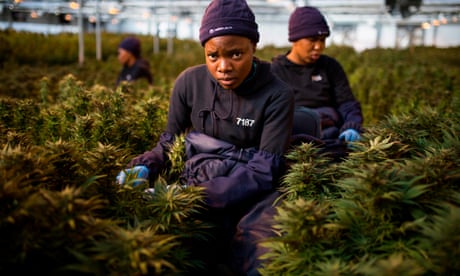‘Swazi gold’: grandmothers in Eswatini growing cannabis to make ends meet
- Get link
- X
- Other Apps
In the poverty-stricken kingdom, an older generation rely on growing marijuana to feed children orphaned by Aids epidemic

In Nhlangano, in the south of Eswatini (formerly Swaziland), the illegal farming of the mountainous kingdom’s famous “Swazi gold” is a risk many grandmothers are ready to take.
In what is known locally as the “gardens of Eden”, a generation of grandparents are growing cannabis, many of them sole carers for some of the many children orphaned by the HIV/Aids epidemic that gripped southern Africa.
The plots of marijuana are tucked away in forests in the mountains. Around one tiny village alone, the Guardian counted 17 fields of cannabis plants.
Noncedo Manguya is the breadwinner for her family of five grandchildren and two other children from her extended family, who were left in her care after the death of their parents. Manguya, 59, struggled to find a job or start a business and makes money by illegally growing marijuana, or dagga, that she sells on to dealers in South Africa.
“Poverty led me into this business. There are no jobs. These children need to go to school but there is no help at all from government. I have to commit crime, farming weed, to ensure I take care of them,” she says.
“I had three children but they all passed away, leaving me with five grandchildren to care for. All my children were HIV positive and they died because of that. I also take care of two other children, relatives to my late husband, whose parents are also dead.”
Manguya is one of many women in the country who depend on farming marijuana for a living.
They sell a gram of cannabis for seven to 10 rand (about 50p) in South Africa and Mozambique, where it is resold for 10 times the price.
With a population of 1.1 million, Eswatini, the last absolute monarchy in Africa, ruled for the past three decades by King Mswati III, has an unemployment rate of nearly 24%, a poverty rate of 52% and GDP growth of -3.3%.
The highest HIV prevalence in the world has left 150,000 children orphaned with older siblings or frail grandparents struggling to raise small children.

According to the International Labour Organization, 23.7% of women in Eswatini are unemployed and at least half of that number resort to sex work or other illicit trades, such as marijuana cultivation or selling smuggled alcohol.
“Yes, we farm the Swazi gold. I have been in this marijuana business for 11 years. My garden of Eden spares us from dying of hunger. Children have something to wear, something to eat every day, and our lives have become better,” says Manguya.
These women face many challenges, with the authorities using networks of spies in local communities, while some police officers solicit bribes.
“The weed business attracts police attention. Police sometimes burn our crop, or if they catch you after harvesting, they confiscate your product.
“Our market is in South Africa but even if you manage to cross the border into South Africa, clients can tell you that your weed is sub-standard, pushing you to sell at a lower price or to look for other clients. This might expose you to criminal gangs, resulting in you being robbed or raped.
“It is hard being a woman in a country where policies do not prioritise the welfare of women and children.”
In Mashobeni village, Lessie Mbenyu lives with her late mother’s sister. Her aunt’s garden pays for her education.
“I’m still in school but, with Covid-19 lockdowns, we spend more time in the garden. If our marijuana does not do well, we starve. My auntie is the head of the family, then her two children and my little brother.
“We see no reason for going back to school because we will not have jobs, even if we become professors. The government and its police want us to suffer.
“If they do not want prisons to be full with people who do illegal deals to survive, they should start giving grants to kids and families affected by HIV/Aids,” Mbenyu says.
In May, scores of people died in protests that rocked Eswatini. Demonstrators demanded democratic reforms, accusing King Mswati of repression. Rights groups accused the royal family, including the king’s 15 wives, of enjoying a lavish lifestyle while most people live in poverty.
Sibusiso Siyaya, spokesperson for the country’s main opposition party, the People’s United Democratic Movement, says the king fails to prioritise people’s needs.
“Communities resort to illegal means of survival because the government of King Mswati III has played a prominent role in institutionalising poverty,” he says.
“The government has stunted the country’s economic development and failed to build a broad-based competitive economy, relying only on foreign direct investment for development. This has resulted in an increased rate of unemployment and degeneration of public institutions, such as the health sector,” says Siyaya.
“The government has downplayed efforts by organisations that have committed themselves in the fight against HIV/Aids in this country. Interventions of increasing economic resilience within communities have been initiated. However, the government has failed to support such initiatives to deliver the desired results,” he adds.
A representative for the Swazi Rural Women’s Assembly, an organisation that seeks to empower rural women, says more needs to be done in creating decent jobs.

“Women are the most affected, especially in rural areas. Farming the Swazi gold is not by choice. They have no other means of generating income.
“As much as NGOs are trying to assist, there are many barriers, which need to be addressed at governance level. Young women end up in sex work driven by poverty and, in turn, the issue of HIV/Aids is exacerbated,” she says.
A Ministry of Agriculture spokesperson, who spoke on condition of anonymity, argued that the geographical location of Eswatini contributed to the economic challenges.
“Eswatini is a landlocked, mountainous country with not enough land for our people to utilise for feeding their families or for commercial purposes. As for marijuana farming, I understand the police have dealt with criminal elements who wanted to contaminate our communities. It’s all under control,” he says.
The opposition party dismisses this explanation: “It is not true that Eswatini doesn’t have enough land for farming. The country has idle land said to belong to the king. The country needs to redress past injustices of a system that sought to enrich a few at the expense of the majority, in particular women and the youth.”
Currently, there is only one legal Eswatini cannabis grower: the US-based Profile Solutions Inc has a licence to grow and process medical cannabis and hemp for a minimum of 10 years.
But, despite the risks, the Swazi gold grandmothers do not want to join the legal market: “Legalising weed might be a threat to our market, as prices might drop. We want the current situation to remain in place,” says Mbenyu.
… as you’re joining us today from South Africa, we have a small favour to ask. Tens of millions have placed their trust in the Guardian’s high-impact journalism since we started publishing 200 years ago, turning to us in moments of crisis, uncertainty, solidarity and hope. More than 1.5 million readers, from 180 countries, have recently taken the step to support us financially – keeping us open to all, and fiercely independent.
With no shareholders or billionaire owner, we can set our own agenda and provide trustworthy journalism that’s free from commercial and political influence, offering a counterweight to the spread of misinformation. When it’s never mattered more, we can investigate and challenge without fear or favour.
Unlike many others, Guardian journalism is available for everyone to read, regardless of what they can afford to pay. We do this because we believe in information equality. Greater numbers of people can keep track of global events, understand their impact on people and communities, and become inspired to take meaningful action.
We aim to offer readers a comprehensive, international perspective on critical events shaping our world – from the Black Lives Matter movement, to the new American administration, Brexit, and the world's slow emergence from a global pandemic. We are committed to upholding our reputation for urgent, powerful reporting on the climate emergency, and made the decision to reject advertising from fossil fuel companies, divest from the oil and gas industries, and set a course to achieve net zero emissions by 2030.
If there were ever a time to join us, it is now. Every contribution, however big or small, powers our journalism and sustains our future. Support the Guardian from as little as $1 – it only takes a minute. If you can, please consider supporting us with a regular amount each month. Thank you.



Comments
Post a Comment